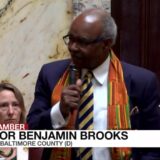“This is government. We can’t have things that are done undercover.”
By Rosalind Adams, THE CITY
A New York lawmaker called for the state to sever its relationship with a Chicago-based private equity firm helping to fund weed dispensaries run by people impacted by the war on drugs following a report from THE CITY revealing alarming details of the agreement.
“The state and the cannabis marketplace would be better served by investing our stake in non-profit community development funding and ending the relationship with these predatory stakeholders,” said state Sen. Gustavo Rivera (D-The Bronx), a member of the cannabis subcommittee.
In 2021, Gov. Kathy Hochul (D) announced a $200 million public–private fund that would offer loans to a special class of retail licensees created for people impacted by drug convictions. Those loans would cover the costs of building out their own stores at locations scouted and leased by the fund. New York allocated $50 million to the fund and secured additional private capital through a loan from Chicago Atlantic Group, a real estate investment group.
But last month, THE CITY revealed that the cannabis fund is locking licensees into loans as high as $2 million to build out each dispensary with strict repayment terms that experts say are likely to lead those licensees to default. The details of the agreement, which state officials refused to make public, reveal that the state guaranteed Chicago Atlantic Group’s return on its investment no matter how the stores perform—ultimately leaving taxpayers to pay if the dispensaries fail.
He said that he was “deeply concerned” that the deal is “placing an outsized, unsustainable debt burden on licensees with the potential to extract all of their profit and then some.”
Concerns about the New York Social Equity Cannabis Investment Fund’s deal with Chicago Atlantic surfaced last October at a hearing about cannabis legalization led by Sen. Jeremy Cooney (D-Rochester), who chairs the cannabis subcommittee. State officials defended the terms of the loan at the hearing and said they were committed to the success of the licensees’ stores. But some licensees and advocates raised alarms about the high costs associated with the loans.
The fund “is exposing the most vulnerable New Yorkers to predatory exploitation,” Eli Northrup, a Bronx Defenders lawyer who works with license applicants, said in his testimony on October 30.
At the time, few details were known about the deal that state officials had agreed to in order to secure funding from Chicago Atlantic Group.
Assembly Majority Leader Crystal Peoples-Stokes (D-Buffalo), who sponsored the original cannabis legalization bills, said in an interview with THE CITY last week that leaders declined to share with her the details of the agreement. Cooney also told THE CITY that he had not seen the agreement.
“I do have a problem with the lack of transparency on what the agreement looked like. I’m not the only one who asked for an opportunity to take a look at it but it wasn’t provided.” Peoples-Stokes said. “This is government. We can’t have things that are done undercover.”
State agencies denied multiple Freedom of Information Law requests and appeals for the document by THE CITY, which eventually obtained a late draft copy of the agreement as well as internal agency documents that showed the Office of Cannabis Management was also concerned about the deal.
Peoples-Stokes said that while she was not surprised by the revelation that the state had agreed to guarantee Chicago Atlantic Group a 15 percent interest rate on its loan to the fund, it showed that the state could have simply directly offered the loans directly to the licensees.
“Honestly, we all would have probably been run out of here, but the state should have just funded this themselves,” she said.
THE CITY also found that the loans offered to licensees by the fund in at least some cases contained inflated costs.
Last year, the fund offered a licensee, Keith Dalessio, a dispensary site in Astoria. When he learned that the loan to cover the construction costs would be at least $1.6 million, it was so astronomical that he wasn’t sure he wanted to accept a loan from the fund at all. Dalessio, who owns a nearby pet shop, later discovered a subcontractor had done the build-out work for only about $250,000, according to invoices reviewed by THE CITY. Eventually he decided to walk away from the fund’s loan offer.
Today, the storefront sits empty. The fund has spent more than $2 million on the location between rent and build-out costs.
Peoples-Stokes told THE CITY that she still supported providing loans through the fund because they offer an opportunity for people who may not qualify for small business loans. But she added that she wanted to see the costs associated with the loans lowered.
“Not every store needs to be a flagship location. There are people who are in business who did not take loans from the fund, and they have beautiful businesses. I’ve been to them,” she said. “The costs of construction can be brought way down.”
Cooney told THE CITY the deal with Chicago Atlantic deserved more scrutiny. “New York State should be doing everything it can to support the success of entrepreneurs impacted by the failed War on Drugs,” he said. “The fact that the social-equity fund may be having the opposite impact is very concerning.”
THE CITY is a nonprofit newsroom that serves the people of New York. Sign up for our SCOOP newsletter and get exclusive stories, helpful tips, a guide to low-cost events, and everything you need to know to be a well-informed New Yorker. DONATE to THE CITY
Most Americans Who Have Tried Marijuana Or Psychedelics Had ‘Positive’ Experiences, Survey Finds





















